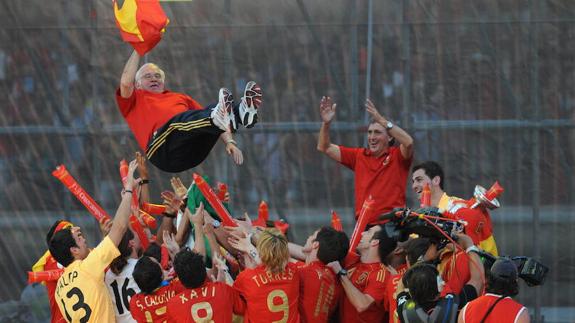

Secciones
Servicios
Destacamos

Daryl Finch
Friday, 28 July 2017, 18:55
It was an unpopular decision; but he never shied away from controversy (he once got into a spot of bother for calling Thierry Henry a black shit). Ahead of his sides Euro 2008 qualifier against Sweden, Spain coach, Luis Aragonés, left Raúl, captain of both Spain and Real Madrid, out of his squad. It was the first time in ten years that the Galáctico had been omitted by his national side.
I have chosen the players that I think are in the best form at this moment in time, said Aragonés. Even so, he had just done the unthinkable.
Doing away with Raúl was just the beginning. For years, Spain went into major competitions with really strong squads, but always fell short because of an apparent shortage of mental strength. Getting rid of the star brought an end to an over reliance on a star player.
Following Spains shock defeat to Northern Ireland earlier that month, Aragonés also dropped winger Joaquín, left back Mariano Pernia and midfielder Borja Oubiña.
It was not only the personnel that would be changing. With a new spine built around Xavi, Andrés Iniesta and Cesc Fàbregas, Aragonés knew that his team couldnt compete on a physical level with their opponents. What they had to do was dominate possession of the ball, make the opposition do the running, and rely on quick short passing and intelligent movement to break down defences.
This style, tiki-taka as it became known, changed the face of world football, setting the benchmark for the way football should be played.
It wasnt something knew; its roots came from the time Johan Cruyff coached Barcelona in the late 1980s and early 90s. However, what Spain under Aragonés (and Barcelona under Pep Guardiola) started to do was pair this style with pragmatism and positional flexibility.
Change was coming, but few would have quite envisaged the success that would be about to come the veteran coachs way when he named his final squad for the tournament which only included two players with over 50 caps (Carles Puyol and Xavi).
Far from household names, the likes of Marcos Senna, Dani Güiza and Joan Capdevila would all prove important cogs in the machine that would go on to beat Germany by one goal to nil in the final, Spains first major trophy win in 44 years.
This was the turning point in the history of Spanish football, with Aragonés successor in the dug out, Vicente del Bosque, following the blueprint to win the World Cup in 2010 and the Euros again in 2012. Many observers suggest the Spanish success story didnt continue because Del Bosque himself could have done with his own Raúl moment, instead of remaining faithful to the tried and tested.
When Aragonés died on 1 February 2014 in Madrid from leukemia, tributes poured in from around the world for one of the games greatest innovators.
Atlético Madrid, for whom he is the top scorer in their history and who he managed in four separate spells, marked his passing with his name on their collars during the 2014 Champions League final. Fans also called for their new stadium, which will actually be called the Wanda Metropolitano for sponsorship reasons, to bear his name.
Publicidad
Publicidad
Publicidad
Publicidad
Esta funcionalidad es exclusiva para registrados.
Reporta un error en esta noticia

Debido a un error no hemos podido dar de alta tu suscripción.
Por favor, ponte en contacto con Atención al Cliente.

¡Bienvenido a SURINENGLISH!

Tu suscripción con Google se ha realizado correctamente, pero ya tenías otra suscripción activa en SURINENGLISH.
Déjanos tus datos y nos pondremos en contacto contigo para analizar tu caso

¡Tu suscripción con Google se ha realizado correctamente!
La compra se ha asociado al siguiente email
Comentar es una ventaja exclusiva para registrados
¿Ya eres registrado?
Inicia sesiónNecesitas ser suscriptor para poder votar.